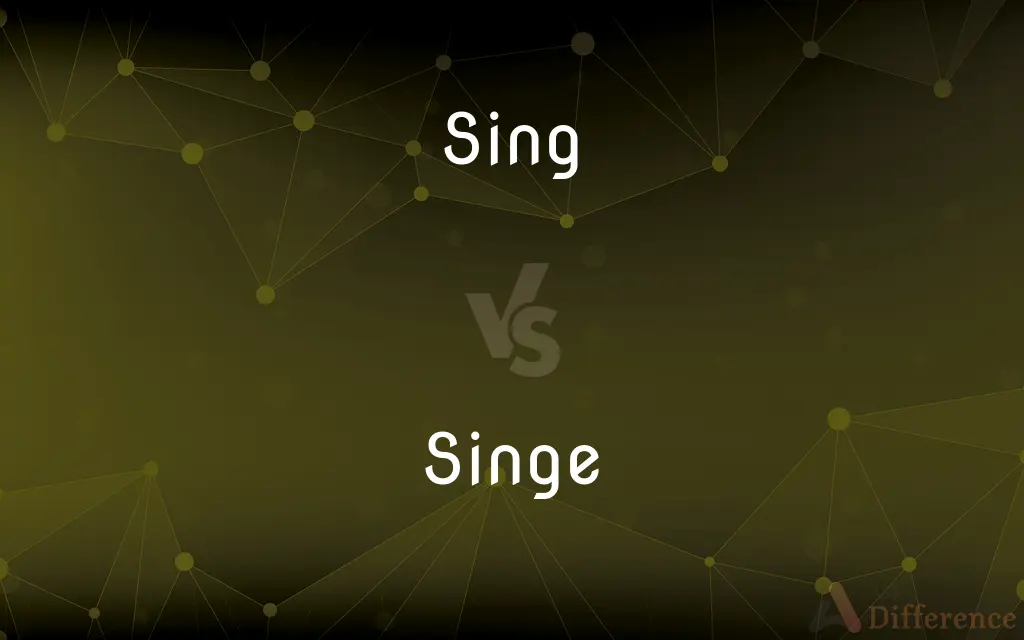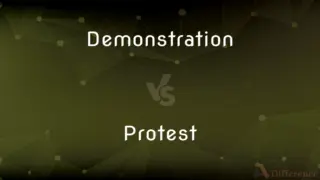Sing vs. Singe — What's the Difference?
By Urooj Arif & Fiza Rafique — Updated on March 31, 2024
Sing involves producing musical sounds with the voice, showcasing melody and harmony, while singe means to lightly burn or scorch the surface of something.

Difference Between Sing and Singe
Table of Contents
ADVERTISEMENT
Key Differences
Sing is an act of vocal expression that creates musical notes and rhythms, often performed to convey emotion or storytelling. It involves the use of vocal cords to produce sounds that vary in pitch, volume, and duration to form music. Whereas, singe refers to a process of burning superficially or lightly, usually causing minor damage or altering the appearance of the surface of an object. This action does not involve the production of music or sound but is rather a physical alteration of material.
While singing is a talent or skill that can be improved with practice and is often an essential component of musical performances, singeing is a quick, light burn that might be intentional, such as in culinary processes to remove hair from poultry, or accidental, due to brief contact with fire or heat. Singing can evoke a wide range of emotions and is used in various cultural and social contexts, on the other hand, singeing is a specific, controlled use of heat with practical applications.
Singing requires a complex coordination of breathing, vocal cord vibration, and articulation to produce desired musical tones and is considered an art form that spans genres and cultures. In contrast, singeing is a straightforward physical reaction to heat that requires minimal skill and is used for practical purposes rather than artistic expression.
Singers often perform in front of audiences, either solo or with a group, and may use microphones and sound systems to amplify their voice. Singeing, however, is usually a quick, solitary action that involves direct application of heat to an object and does not require an audience or specialized equipment beyond a heat source.
Singing can be professionally recorded, broadcasted, and enjoyed by listeners across the world, becoming a part of cultural identity and heritage. Singeing, while useful in its specific contexts such as in cooking or manufacturing, does not carry the same cultural significance or wide-reaching impact.
ADVERTISEMENT
Comparison Chart
Definition
Producing musical sounds with the voice
Lightly burning the surface of something
Skill/Art Form
Yes
No
Purpose
Artistic expression, entertainment
Practical, such as in cooking or manufacturing
Requires
Vocal cords, practice, and often an audience
Heat source and material to be singed
Cultural Significance
High, with variations across music genres and traditions
Low, mostly practical with no cultural expression
Compare with Definitions
Sing
To vocalize musical tones.
She loves to sing along to her favorite songs.
Singe
To burn slightly or superficially so as to affect the color.
The chef singed the chicken feathers to clean its skin.
Sing
To make musical sounds with the voice, especially words with a set tune.
They sing beautifully together in harmony.
Singe
To lightly char the surface of something.
The laser singed the paper during the cutting process.
Sing
To express or tell in song.
The bard sings of ancient heroes and their deeds.
Singe
To scorch or burn the ends or edges of.
She accidentally singed the edge of her sleeve while cooking.
Sing
To celebrate or praise in song.
The choir sings praises every Sunday.
Singe
To expose briefly to heat.
He singed the fabric to create a distressed look.
Sing
To perform a song or piece of music vocally.
He will sing the national anthem at the game.
Singe
To cause to dry up or shrivel with heat.
The intense sun singed the leaves of the plants.
Sing
Make musical sounds with the voice, especially words with a set tune
Bella sang to the baby
Singe
A singe is a slight scorching, burn or treatment with flame. This may be due to an accident, such as scorching one's hair when lighting a gas fire, or a deliberate method of treatment or removal of hair or other fibres.
Sing
Make a high-pitched whistling or buzzing sound
The kettle was beginning to sing
Singe
To burn superficially; scorch.
Sing
Act as an informer to the police
As soon as he got put under pressure, he sang like a canary
Singe
To burn off the feathers or bristles of (a carcass of a bird or animal) by subjecting briefly to flame.
Sing
Recount or celebrate in poetry or other literature
Poetry should sing the variety of the human race
These poets sing of the American experience
Singe
(transitive) To burn slightly.
Sing
An act or spell of singing
We asked him to come back and have a bit of a sing
A sponsored sing to pay for the theatre
Singe
(transitive) To remove the nap of (cloth), by passing it rapidly over a red-hot bar, or over a flame, preliminary to dyeing it.
Sing
To utter a series of words or sounds in musical tones.
Singe
(transitive) To remove the hair or down from (a plucked chicken, etc.) by passing it over a flame.
Sing
To vocalize songs or selections.
Singe
A burning of the surface; a slight burn.
Sing
To perform songs or selections as a trained or professional singer.
Singe
To burn slightly or superficially; to burn the surface of; to burn the ends or outside of; as, to singe the hair or the skin.
You sulphurous and thought-executing fires, . . . Singe my white head!
I singed the toes of an ape through a burning glass.
Sing
To produce sounds when played
Made the violin sing.
Singe
To remove the nap of (cloth), by passing it rapidly over a red-hot bar, or over a flame, preliminary to dyeing it.
Sing
To make melodious sounds
Birds singing outside the window.
Singe
A burning of the surface; a slight burn.
Sing
To give or have the effect of melody; lilt.
Singe
A surface burn
Sing
To make a high whining, humming, or whistling sound.
Singe
Burn superficially or lightly;
I singed my eyebrows
Sing
To be filled with a buzzing or ringing sound.
Singe
Become superficially burned;
My eyebrows singed when I bent over the flames
Sing
To proclaim or extol something in verse.
Sing
To write poetry.
Sing
(Slang) To give information or evidence against someone.
Sing
To produce the musical sound of
Sang a love song.
Sing
To utter with musical inflections
She sang the message.
Sing
To bring to a specified state by singing
Sang the baby to sleep.
Sing
To intone or chant (parts of the Mass, for example).
Sing
To proclaim or extol, especially in verse
Sang his praises.
Sing
A gathering of people for group singing.
Sing
(intransitive) To produce musical or harmonious sounds with one’s voice.
"I really want to sing in the school choir," said Vera.
Sing
(intransitive) To perform a vocal part in a musical composition, regardless of technique.
Sing
(transitive) To express audibly by means of a harmonious vocalization.
Sing a lullaby
Sing
(transitive) To soothe with singing.
To sing somebody to sleep
Sing
(ambitransitive) Of birds, to vocalise:
Sing
(ornithology) To produce a 'song', for the purposes of defending a breeding territory or to attract a mate.
Sing
(literary) To produce any type of melodious vocalisation.
Sing
To confess under interrogation.
Sing
(intransitive) To make a small, shrill sound.
The air sings in passing through a crevice.
A singing kettle
Sing
To relate in verse; to celebrate in poetry.
Sing
(intransitive) To display fine qualities; to stand out as excellent.
The sauce really makes this lamb sing.
Sing
(ergative) To be capable of being sung; to produce a certain effect by being sung.
Sing
(AU) In traditional Aboriginal culture, to direct a supernatural influence on (a person or thing), usually malign; to curse.
Sing
The act, or event, of singing songs.
I sometimes have a quick sing in the shower.
Sing
To utter sounds with musical inflections or melodious modulations of voice, as fancy may dictate, or according to the notes of a song or tune, or of a given part (as alto, tenor, etc.) in a chorus or concerted piece.
The noise of them that sing do I hear.
Sing
To utter sweet melodious sounds, as birds do.
On every bough the briddes heard I sing.
Singing birds, in silver cages hung.
Sing
To make a small, shrill sound; as, the air sings in passing through a crevice.
O'er his head the flying spearSang innocent, and spent its force in air.
Sing
To tell or relate something in numbers or verse; to celebrate something in poetry.
Bid her . . . singOf human hope by cross event destroyed.
Sing
To cry out; to complain.
They should sing if thet they were bent.
Sing
To utter with musical inflections or modulations of voice.
And they sing the song of Moses, the servant of God, and the song of the Lamb.
And in the darkness sing your carol of high praise.
Sing
To celebrate in song; to give praises to in verse; to relate or rehearse in numbers, verse, or poetry.
Arms and the man I sing.
The last, the happiest British king,Whom thou shalt paint or I shall sing.
Sing
To influence by singing; to lull by singing; as, to sing a child to sleep.
Sing
To accompany, or attend on, with singing.
I heard them singing home the bride.
Sing
Deliver by singing;
Sing Christmas carols
Sing
Produce tones with the voice;
She was singing while she was cooking
My brother sings very well
Sing
To make melodious sounds;
The nightingale was singing
Sing
Make a whining, ringing, or whistling sound;
The kettle was singing
The bullet sang past his ear
Sing
Divulge confidential information or secrets;
Be careful--his secretary talks
Common Curiosities
What does singe mean?
Singe means to lightly burn or scorch something's surface without igniting it.
Do you need special equipment to sing?
While basic singing requires no equipment, professional singing may use microphones and amplification for performances.
Can singing be learned?
Yes, singing can be improved with practice and training, focusing on techniques like breath control and pitch accuracy.
Is singeing always intentional?
Singeing can be both intentional, as in culinary preparation, or accidental, through brief contact with a heat source.
Can anyone sing?
Most people can sing to some degree, but the quality of voice and musicality varies widely among individuals.
What materials can be singed?
Various materials can be singed, including textiles, hair, and food items, depending on the context.
What are the risks of singeing?
Singeing carries the risk of unintended fire or damage to materials if not carefully controlled.
What does sing mean?
Sing refers to producing musical sounds with the voice, often conveying a song or melody.
What precautions should be taken when singeing?
Safety precautions for singeing include using a controlled heat source and protecting surrounding areas from accidental burns.
Is singing a form of communication?
Yes, singing can express emotions, tell stories, and convey messages through lyrics and melodies.
Can singeing change the texture of food?
Yes, singeing can alter the texture of food, often creating a crispy or slightly charred exterior.
How is singeing used in cooking?
Singeing is used in cooking to remove hair from poultry or to create a charred flavor on vegetables and meats.
How does singing impact mood and emotions?
Singing can have a profound effect on mood and emotions, often inducing joy, nostalgia, or therapeutic benefits.
Is singing a cultural activity?
Singing is deeply ingrained in many cultures as a form of artistic expression, storytelling, and social bonding.
What distinguishes singing from speaking?
Singing differs from speaking in melody, pitch range, and rhythmic patterns, focusing on musical expression.
Share Your Discovery

Previous Comparison
Solvation vs. Hydration
Next Comparison
Demonstration vs. ProtestAuthor Spotlight
Written by
Urooj ArifUrooj is a skilled content writer at Ask Difference, known for her exceptional ability to simplify complex topics into engaging and informative content. With a passion for research and a flair for clear, concise writing, she consistently delivers articles that resonate with our diverse audience.
Co-written by
Fiza RafiqueFiza Rafique is a skilled content writer at AskDifference.com, where she meticulously refines and enhances written pieces. Drawing from her vast editorial expertise, Fiza ensures clarity, accuracy, and precision in every article. Passionate about language, she continually seeks to elevate the quality of content for readers worldwide.














































